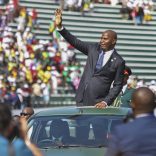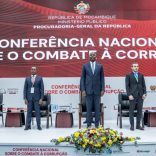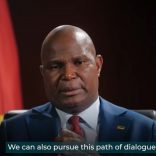Mozambique: Collective effort needed to fight corruption - president
Mozambique: SADC Double Troika agrees to convene again in June – AIM report

From let to right: Cyril Ramaphosa, Mokgweetsi Masisi, Filipe Nyusi and Lazarus Chakwera. [Photo: / Office of the President| Republic of Botswana. / @BWPresidency]
The Extraordinary Summit of the “Double Troika” of the Southern African Development Community (SADC), meeting on Thursday in Maputo, noted progress in finding a lasting solution to terrorism and acts of violent extremism in the northern Mozambican province of Cabo Delgado and considered the proposed regional response in support of the country.
This was among the decisions of the Double Troika Summit of regional leaders who also agreed to convene for another extraordinary summit by 20 June in Maputo.
The final communiqué from the meeting also noted progress towards the establishment of the SADC Humanitarian and Emergency Operations Centre (SHOC), which will enhance regional capabilities in risk and disaster management, and commended Mozambique’s commitment to host this centre.
Mozambican President Filipe Nyusi, who is the current chairperson of SADC, in his closing remarks reaffirmed Mozambique’s own responsibility to lead the fight against terrorism alongside SADC member states and other cooperation partners willing to provide the necessary support for a successful and urgent restoration of normality.
“We trust that the conditions for the fight without borders of the global threat have been created and that our government will play a crucial role in steering the actions for an effective achievement of all the decisions intended to eradicate terrorism, which is a sine qua non for the stability, progress and wellbeing of our people,” Nyusi said.
The summit’s discussions, he added, “confirm our understanding about the evil nature of the terrorist groups operating at the confluence between organised crime, extremism and radicalization, without any agenda or legitimate claim, but jeopardising values of peace and security which are the cornerstones of the regional community”.
He stressed that the fight against terrorism cannot be won by closing borders to other bilateral and international support. Therefore the SADC region must coordinate the process and allow Mozambique to receive such support. “The fight against terrorism requires resources to guarantee humanitarian assistance which is, day by day, becoming ever scarcer,” he warned.
Nyusi said the member states have also agreed on a comprehensive and inclusive response to the terrorism imposed on the population of Cabo Delgado,” pointing out that the Double Troika summit had reaffirmed SADC’s role as a regional leader in fighting terrorism in Mozambique, thus reinforcing the principles of peace, security and stability as conditions for the implementation of regional development projects.
Nyusi said the leaders were coming out of the summit “more resolute, strengthened and clear about the concrete steps we should take to contain the attacks waged by men who have become instruments of organized crime”.
Also read:
“We have adopted measures seeking to eliminate, by the roots, the terrorist actions through strengthening the operational capacity of the Mozambican defence and security forces, through border security, through eliminating the sources of finance for terrorism, and rebuilding the infrastructures that have been destroyed”, Nyusi declared.
He said the “urgent and multifaceted” response” to terrorism would include “measures for greater social inclusion, more employment, more academic and professional training, more investment, and the provision of humanitarian assistance”.
Neither Nyusi’s speech, nor the final statement from the summit, contained a clear reference to SADC military intervention in Cabo Delgado – although in April a SADC technical commission, looking into the nature of the terrorist threat in Cabo Delgado, and the type of support that Mozambique requires, recommended that a regional rapid response force, almost 3,000 strong, be deployed to Cabo Delgado immediately.
Also read: Tanzania will not send troops to Mozambique – report
However, the statements by both Nyusi and by Botswana President Mokgweetsi Masisi, who is the current chair of the SADC organ on politics, defence and security cooperation, implied that military support will be welcomed.
Masisi stressed that SADC must show that it will never accept the presence of terrorists in the member states. He recalled that, at a previous extraordinary summit, on 8 April, “we spoke in unison and said that now is the time to act collectively and send an unequivocal message to the terrorists that this region will never accept any brutal assault and destruction of innocent lives”.
In addition to Nyusi and Masisi, those attending the summit were Malawian President Lazarus Chakwera (who will succeed Nyusi as SADC chairperson), South African President Cyril Ramaphosa, the next chair of the defence and security organ, and the outgoing chair of the organ, Zimbabwean President Emmerson Mnangagwa. The previous SADC chair, Tanzanian President Samia Hassan, was represented by the President of Zanzibar, Hussein Ali Mwinyi.
Also read: EU military mission to Mozambique may be operating in months, bloc says
Watch the Miramar report below.
𝐄𝐗𝐓𝐑𝐀𝐎𝐑𝐃𝐈𝐍𝐀𝐑𝐘 𝐒𝐀𝐃𝐂 𝐎𝐑𝐆𝐀𝐍 𝐓𝐑𝐎𝐈𝐊𝐀 𝐒𝐔𝐌𝐌𝐈𝐓
President Dr @OfficialMasisi has lauded the Extraordinary SADC Organ Troika Summit as a success following the resolve to aide Mozambique.#BWPresidency🇧🇼 pic.twitter.com/Ym596a2B0e— Office of the President| Republic of Botswana. (@BWPresidency) May 27, 2021












Leave a Reply
Be the First to Comment!
You must be logged in to post a comment.
You must be logged in to post a comment.